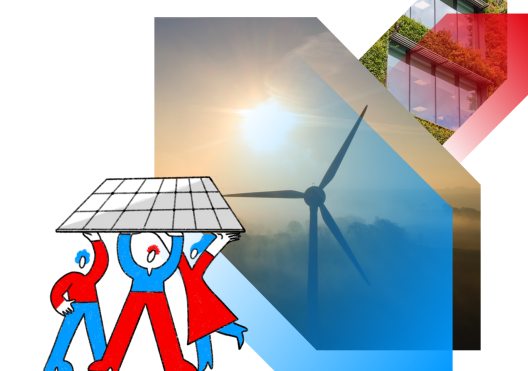As a country that relies on imports and realises the short-sightedness of the linear model of consumption, Luxembourg is making strides towards a more circular economic model, a move that both enables and is enabled by a growing number of locally based cleantech firms.
Aiming to be at the forefront of a 'Third Industrial Revolution' marked by a shift from a linear 'take, make, dispose' economy to a circular economy, Luxembourg is home to an increasing number of cleantech companies. Far from being mere ecological solutions, these firms are competitive and aim to draw value from reusing and recovering energy and materials. Cleantech companies, both those conceived locally and those that originated abroad, are finding that Luxembourg is an ideal place to set up and create new products. Governmental support, a business-friendly climate, and excellent digital infrastructure make Luxembourg a breeding ground for exciting new clean technologies.
Pushing for a circular economy
Luxembourg has enjoyed many years of growth, but leaders realise that if this growth is to be sustainable, the country will have to move towards a circular economy where materials, products, and energy are generated with an eye for reusability. A number of local companies are already active in promoting circularity. These include construction companies like ProGroup, cider manufacturer Ramborn, energy supplier Enovos, and Luxembourg-based steel giant ArcelorMittal.
To encourage other companies to move towards circularity, Luxembourg’s innovation agency Luxinnovation created Fit 4 Circularity. Among other services, this programme helps companies explore the possibility of extending product life cycles while understanding potential gains linked to circular supply chains.
Smart cities on the horizon
An important part of transitioning to a circular economy is the creation of smart cities which are made more efficient by digitalisation and the Internet of Things. To this end, Luxembourg has laid the groundwork. The country’s information and communications technology (ICT) infrastructure is highly developed, and the country was chosen as a site for one of eight European supercomputers which will be available for use in the private sector. And with its experience as a finance centre, one that places a great deal of emphasis on data protection and privacy, it’s an ideal testbed for new digital technologies.
A smart city requires smart mobility which integrates transportation and digitalisation to make getting around more efficient, greener, and cheaper. Luxembourg residents, commuters, and visitors are already taking advantage of the popular mobility app Mobiliteit which offers real-time information and updates about bus, tram, train, bicycle, car-sharing, and walking options. The app is supported by a vast digital infrastructure that highlights the country’s advancement in this field.
To encourage people to drive less and reduce their carbon footprint, Luxembourg will be the first country to offer nation-wide free public transport, a move that will be facilitated by the mobility app. Public transport itself is becoming greener, and many municipalities already use electric or hybrid buses on their bus lines. Electric car owners are also enjoying the country’s green commitments as the Grand Duchy will soon have 800 charging stations for electric vehicles, a network that will stretch across the country.
Steady progress in waste management and water treatment
Luxembourg is experiencing sustained economic and population growth, both of which have placed a strain on waste management. Luxembourg City, by far the country’s largest municipality, has adopted several measures to reduce and reuse waste, efforts that are showing solid gains. The quantity of waste collected by the city is in a downward trend and officials are working hard towards meeting the EU target which calls for the recovery of at least 50 percent of household waste by 2020. Some of the well-funded measures that are helping to reduce waste that goes into landfills are the door-to-door collection of organic waste and some plastics, tin, and Tetra Pak, a sprawling and well-organised recycling center, and a modern incineration plant that generates electricity.
While Luxembourg municipalities are still struggling to fully modernise their wastewater treatment plants, Luxembourg-based Apateq is leading the way in wastewater treatment technology. The company engineers and manufactures oil-water separation systems, compact wastewater treatment plants, and pre-treatment systems for industrial wastewaters – which means more water reuse and less waste. Recently, the company built an innovative plant to treat brackish and industrial process water on the Swedish island of Öland.
Energy transition
Luxembourg aims to make 11 percent of its energy renewable by 2020, and according to officials, the country is well on its way to achieving this, a benchmark which represents a doubling of renewable energy usage in only two years. Moreover, Luxembourg passed a 2019 climate law and developed an action plan to become climate neutral by 2050. The national energy supplier Enovos now offers, for a monthly fee, the chance for households to transition on their own to 100-percent green energy, with electricity produced from solar, wind, and biomass in new, technologically advanced power plants.
Luxembourg is an early adopter of smart metering, which means that nearly every household has a modern, digitally connected metre. This eliminates the need for metre readers to travel to each household while at the same time giving consumers insight into their own energy consumption and the opportunity to modify their usage. It also allows energy to be produced, consumed, and stored in a more intelligent and sustainable manner.
Research
The research-driven University of Luxembourg conducts advanced research in fields integral to cleantech including photovoltaics, energy materials, and advanced materials, while the Luxembourg Institute of Science and Technology (LIST) has a large research department staffed by 180 scientists and engineers dedicated to addressing environmental issues. The aim of this departement, Environmental Research and Innovation (ERIN), is to integrate knowledge and skills in a variety of disciplines to grapple with serious environmental issues like climate change mitigation, ecosystem resilience, sustainable energy systems, and environmental pollution prevention.
Stay informed! Sign up to receive our latest updates.
Planning your event in the Grand Duchy? We'd love to help.







